IN THIS ARTICLE:
- Introduction: Engineered Hardwood Flooring vs Luxury Vinyl Plank (LVP)
- What Is Engineered Hardwood Flooring?
- What Is Luxury Vinyl Plank (LVP) Flooring?
- What Is SPC Flooring (Stone Plastic Composite)?
- Engineered Hardwood vs Vinyl Plank: Direct Comparison
- Engineered Wood vs Luxury Vinyl Flooring: Side-by-Side
- Key Differences Between Engineered Hardwood and LVP
- Factors to Consider Before Choosing
- FAQs: Engineered Hardwood vs Luxury Vinyl Plank
- Conclusion: Choosing the Best Flooring for Your Home
Choosing new floors can feel overwhelming. With so many materials competing for attention, how do you even begin to decide—engineered hardwood or luxury vinyl plank? Rustic character or modern minimalism? It’s a lot to sort through.
Take a breath. This doesn’t have to be frustrating. At Cabinets Core, we’ve guided thousands of homeowners through the flooring decision and made the process clear, practical, and even enjoyable.
In this guide, we focus on the real-world matchup that most Seattle-area homes consider: engineered hardwood vs luxury vinyl plank (LVP). You’ll see how engineered wood flooring stacks up against luxury vinyl flooring—including today’s rigid-core options like EVP/SPC—so you can choose confidently.
We’ll break down the essentials that matter in everyday living: durability and scratch resistance, waterproof performance, comfort underfoot, installation approach, maintenance needs, long-term value, and total project cost. If you’ve ever searched vinyl vs engineered hardwood or wondered about the difference between LVP and engineered hardwood, this is the plain-English answer key.
By the end, you’ll know which surface fits your lifestyle, rooms, and budget—whether that means the natural warmth of engineered hardwood flooring or the worry-free resilience of vinyl plank. No more dizzying debates about oak vs walnut or porcelain vs vinyl; just a clear path to floors you’ll love living with.
If you’re in Greater Seattle, you can also see and feel these options in person at our Auburn showroom. We’ll measure your space and provide a free 3D layout so you can preview finishes before you commit.
Let’s dive in and compare engineered hardwood flooring and luxury vinyl plank step by step—so you can make the best choice for your home, once and for all.
1. Introduction: Engineered Hardwood Flooring vs Luxury Vinyl Plank (LVP) ✨
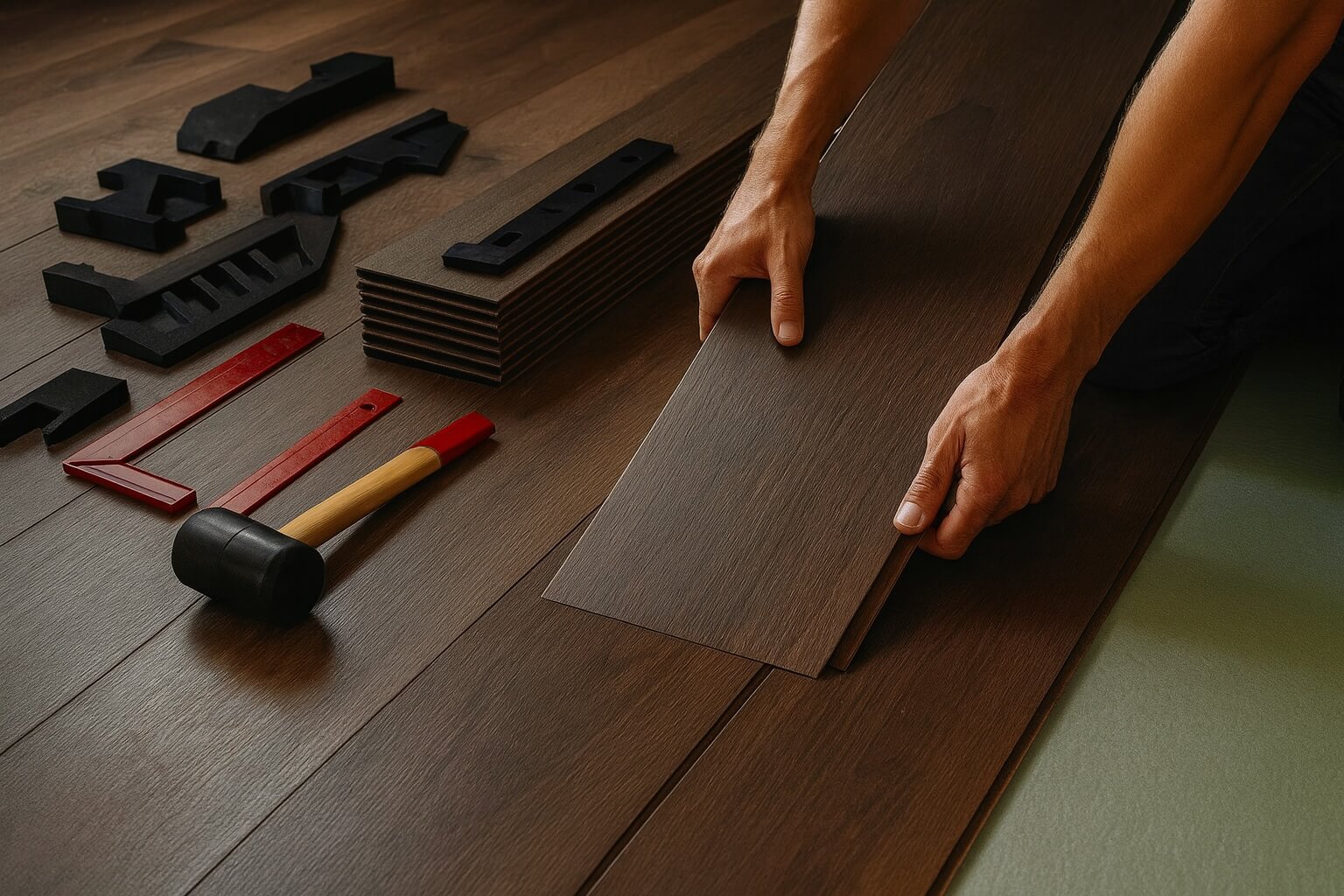
When you start exploring flooring options, terms like engineered hardwood flooring and luxury vinyl plank (LVP) can sound confusing. What do they really mean, and how do they differ from the hardwood and vinyl you already know?
Don’t worry — we’ll break it down clearly and simply so you understand exactly what each option offers before you make your choice.
2. What Is Engineered Hardwood Flooring?🌲
Engineered hardwood flooring combines the timeless look of real wood with a smarter, more practical design. It brings the warmth, texture, and elegance of solid hardwood into your home but avoids many of the drawbacks. Instead of being milled from a single plank, engineered wood is built in layers:
A real hardwood veneer on the surface for authentic grains, knots, and natural beauty.
Strong plywood or high-density fiberboard (HDF) cores underneath for stability and strength.
This layered construction makes engineered wood more resistant to moisture, less likely to warp, and far easier to install than solid hardwood. That’s why engineered hardwood floors are often recommended for basements, kitchens, or bathrooms — places where traditional hardwood struggles.
✅ Key Benefits of Engineered Hardwood Floors
Authentic look & feel – genuine wood veneer provides the same beauty as solid hardwood.
Cost-effective – delivers real wood warmth at a fraction of the price.
Moisture resistance – more stable in humid areas than solid hardwood, though not fully waterproof.
Flexible installation – can be nailed, glued, or floated above, below, or on grade.
Style variety – available in a wide range of engineered wood species like oak, walnut, maple, and exotic options.
🎨 Style Options to Match Any Home
From the rustic character of oak engineered flooring to the deep richness of walnut engineered hardwood floors or the light, modern tones of maple, there’s a finish for every design scheme. Whether you’re planning a traditional remodel or a modern upgrade, engineered wood adapts easily to your style.
⚖️ Engineered Hardwood vs Solid Hardwood
Compared to solid hardwood, engineered floors:
Are less expensive, making them a budget-friendly way to get the look of wood.
Offer better stability in moisture-prone spaces.
Have a wide design range, thanks to different veneer species and stain options.
The main trade-off is that engineered hardwood can’t be refinished as many times as solid wood, but with proper care it will still last for decades.
3. What Is Luxury Vinyl Plank (LVP) Flooring?🏡
Luxury vinyl plank flooring (LVP) has become one of the most popular choices for modern homeowners because it combines style, affordability, and durability in a single package. If you want the warm look of wood floors without the price or upkeep, LVP flooring is worth considering.
🔍 How LVP Flooring Is Made
LVP is a multi-layer flooring product designed to mimic the beauty of hardwood while delivering enhanced performance:
A protective wear layer on top to guard against scratches and stains.
A printed vinyl layer that realistically recreates wood grains, knots, and even distressed finishes.
A waterproof PVC or rigid SPC (Stone Plastic Composite) core for stability and moisture resistance.
Many planks also include an attached underlayment for sound reduction and extra comfort underfoot.
The result? Vinyl wood flooring that looks authentic, feels solid, and performs well in areas where real wood can’t.
✅ Key Benefits of Luxury Vinyl Plank Flooring
Budget-friendly – far more affordable than solid hardwood or even engineered wood.
Waterproof performance – perfect for kitchens, bathrooms, laundry rooms, and basements.
DIY installation – easy click-lock floating installation system allows many homeowners to install it themselves.
Durable & resilient – resists scratches, dents, spills, and heavy foot traffic.
Low maintenance – no refinishing needed; just sweep and mop.
Endless style variety – available in countless colors, widths, and wood-look patterns, from classic oak to bold gray tones.
🌟 Why Homeowners Love LVP Flooring
For families with kids, pets, or busy lifestyles, LVP floors are an ideal solution. They handle spills, moisture, and wear better than most other flooring types, all while offering the natural beauty of hardwood. With today’s advanced printing and texturing technology, many visitors won’t even realize your floors aren’t real wood.
4. What Is SPC Flooring (Stone Plastic Composite)?💎
Alongside engineered hardwood and luxury vinyl plank, another option gaining popularity is SPC flooring, also known as Stone Plastic Composite flooring or rigid core vinyl plank. Think of SPC as a premium upgrade within the vinyl flooring family—designed for homeowners who want maximum strength, water resistance, and durability.
🔍 How SPC Flooring Is Made
SPC shares similarities with standard LVP but uses a different core. Instead of flexible PVC, SPC flooring is created from a blend of:
Natural limestone powder
Stabilizers and resins
Plastic polymers
This combination produces an extremely dense, rigid core that’s tougher than regular vinyl planks.
✅ Key Benefits of SPC Flooring
Superior durability – dense core resists dents, scratches, and heavy impacts.
100% waterproof – ideal for kitchens, bathrooms, and basements.
Authentic feel underfoot – sturdier and more realistic than flexible vinyl plank.
Low maintenance – no refinishing or special treatments required.
Sound insulation – reduces noise more effectively than standard LVP, making it great for high-traffic areas.
Style versatility – available in a wide range of wood and stone designs.
⚖️ SPC vs LVP Flooring
While LVP flooring is more flexible and budget-friendly, SPC flooring offers:
Greater strength and dimensional stability.
A more realistic hardwood-like feel.
Better performance in extreme conditions (humidity, heavy traffic, temperature swings).
The trade-off? SPC is typically a little more expensive, but the long-term value makes it a smart investment for busy households and demanding spaces.
5. Engineered Hardwood vs Vinyl Plank: Direct Comparison ⚖️

When choosing between engineered hardwood flooring and luxury vinyl plank (LVP), the differences can make all the difference in your remodel. Both options have strong advantages, but they’re designed for different priorities.
At its core, engineered wood flooring delivers the authentic beauty of real hardwood with added stability from its layered construction. It feels warm, natural, and timeless—an upgrade that can also increase home value. However, it requires more care than synthetic alternatives.
By contrast, vinyl plank flooring (also called vinyl wood flooring) is built for performance and convenience. It’s fully waterproof, highly durable, and budget-friendly, though it doesn’t carry the same natural depth or resale appeal as real wood.
So when comparing vinyl vs engineered hardwood, here’s the key trade-off:
Choose engineered hardwood if you value authentic wood grain, natural beauty, and long-term home investment.
Choose LVP flooring if you need waterproof protection, resilience against kids and pets, and lower upfront cost.
Let’s dive into a side-by-side comparison of appearance, durability, installation, and cost so you can decide which flooring type fits your lifestyle and budget.
6. Engineered Wood vs Luxury Vinyl Flooring: Side-by-Side 📊
Choosing between engineered hardwood and luxury vinyl plank (LVP) flooring often comes down to the details. To help you compare, here’s a side-by-side look at the key factors — appearance, durability, installation, and cost—that matter most in real homes.
🌟 Appearance & Style
When it comes to appearance, few flooring options can match the natural beauty of engineered hardwood flooring. Because the top layer is real wood, engineered planks showcase genuine variations in grain, knots, and color tones. You’ll find a wide range of options, from classic oak engineered floors to the rich, dark elegance of walnut, or even exotic species like Brazilian cherry and acacia. No two planks are identical, which gives engineered hardwood its depth, warmth, and authenticity.
By comparison, luxury vinyl plank flooring (LVP) has made huge strides in design realism. Using advanced digital printing technology and embossed textures, modern LVP can closely replicate everything from rustic reclaimed wood to sleek contemporary finishes. Some vinyl plank styles even feature textured surfaces that mimic wire-brushed or hand-scraped hardwood, giving them a more natural feel underfoot.
Both materials offer impressive style variety:
Engineered wood floors bring true authenticity and natural variation.
Vinyl wood flooring (LVP) provides budget-friendly flexibility, with designs ranging from light coastal tones to bold gray and black finishes.
If your top priority is genuine wood character, engineered hardwood is unmatched. If you’re looking for affordable versatility and endless wood-look choices, LVP flooring delivers remarkable style without the hardwood price tag.
🛡️ Durability & Scratch Resistance
When it comes to flooring durability, both engineered hardwood and luxury vinyl plank (LVP) perform well under everyday use—but they excel in different ways.
Luxury vinyl plank flooring is built for resilience. Its protective wear layer shields against scratches, dents, and spills, making it especially popular for households with kids, pets, or high-traffic areas. Because LVP is 100% waterproof, it won’t swell, warp, or stain when exposed to moisture. Plus, its printed design layer helps hide minor wear, so floors can look new for years without refinishing.
Engineered hardwood flooring, on the other hand, delivers the natural strength of real wood but requires more care. It is more prone to dents, scratches, and water damage over time, especially in moisture-heavy rooms like kitchens and basements. However, one of its advantages is refinishing—light sanding and refinishing can refresh its surface, extending its lifespan. Keep in mind that engineered wood can only be refinished a limited number of times, depending on the thickness of the veneer.
For many homeowners, the choice comes down to preference:
Choose LVP flooring if you want maximum toughness, waterproof protection, and a low-maintenance surface.
Choose engineered hardwood if you appreciate the authentic patina and character that comes from wood aging gracefully—even with its imperfections.
In short, vinyl plank wins on pure resilience, but engineered wood wins on timeless personality.
🔧 Installation Options
FREE GUIDE: 15 Things to Know When Buying Hardwood Flooring
One of the biggest differences between engineered hardwood flooring and luxury vinyl plank (LVP) is how they’re installed.
Luxury vinyl plank flooring is designed with convenience in mind. Thanks to its floating floor or click-together system, LVP planks can be installed directly over existing floors without nails or glue. The planks lock into place, making it a true DIY-friendly flooring option—many homeowners complete an entire room in a weekend. This ease of installation also keeps labor costs low. The trade-off is that floating vinyl floors may produce a hollow or plasticky sound underfoot unless paired with quality underlayment.
Engineered hardwood installation, on the other hand, is more complex. Depending on your subfloor, it may require nail-down, glue-down, or professional floating installation. The planks are heavier and less flexible than LVP, meaning precision is critical to prevent issues like gapping or warping. While installation costs are higher, many homeowners prefer the solid, natural feel of engineered wood underfoot. The permanence of the installation also enhances long-term stability and value.
When comparing LVP vs engineered hardwood installation, consider your priorities:
LVP flooring is best if you want a quick, affordable, and DIY-friendly option.
Engineered hardwood is ideal if you prefer a more traditional, long-lasting foundation, even if it requires professional installers.
No matter which you choose, proper installation ensures your floors perform beautifully for years to come.
💰 Cost & Value
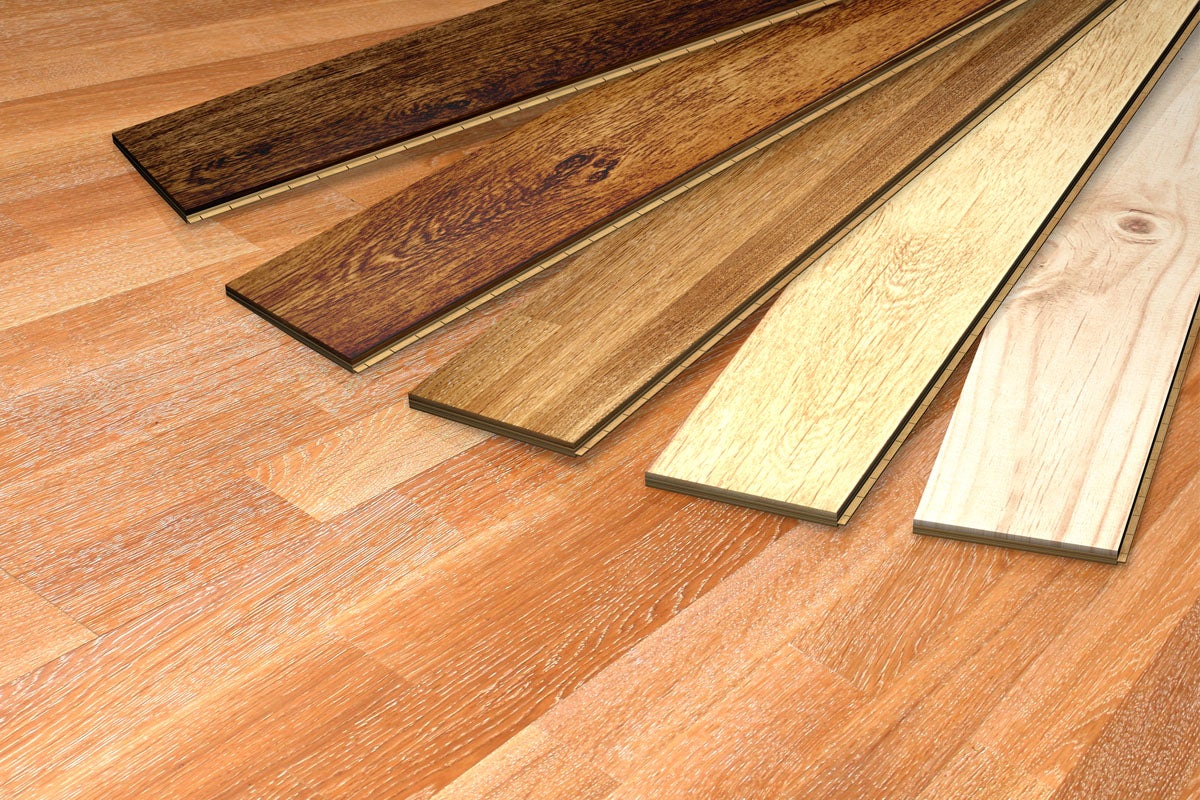
When planning a remodel, flooring costs are often the deciding factor. Between luxury vinyl plank (LVP) and engineered hardwood flooring, there’s a noticeable difference in both upfront and long-term value.
Luxury vinyl plank flooring is usually the most budget-friendly option. Even if you hire professionals, LVP’s installation costs are far lower thanks to its DIY-friendly floating click system. This makes it a go-to choice for homeowners on a tight budget who still want the look of wood.
Engineered hardwood floors, on the other hand, sit in the mid-range price bracket. While not as costly as solid hardwood, engineered planks often require professional installation—adding labor costs to your project. Still, you’re investing in real wood flooring, which carries higher resale appeal and long-term value compared to vinyl alternatives.
Here’s the breakdown:
LVP flooring price: affordable materials + low installation = cost-effective.
Engineered hardwood price: higher upfront investment, but better return on home value.
When comparing LVP vs engineered hardwood flooring cost, think beyond the initial expense. If budget control and easy installation are your top priorities, LVP is the winner. But if you’re aiming to boost home value, elegance, and longevity, engineered hardwood delivers more return on investment.
👉 Pro tip: Always request detailed quotes for both materials and installation labor so you can make an accurate cost comparison before starting your project.
🔑 Key Differences Between Engineered Hardwood and LVP
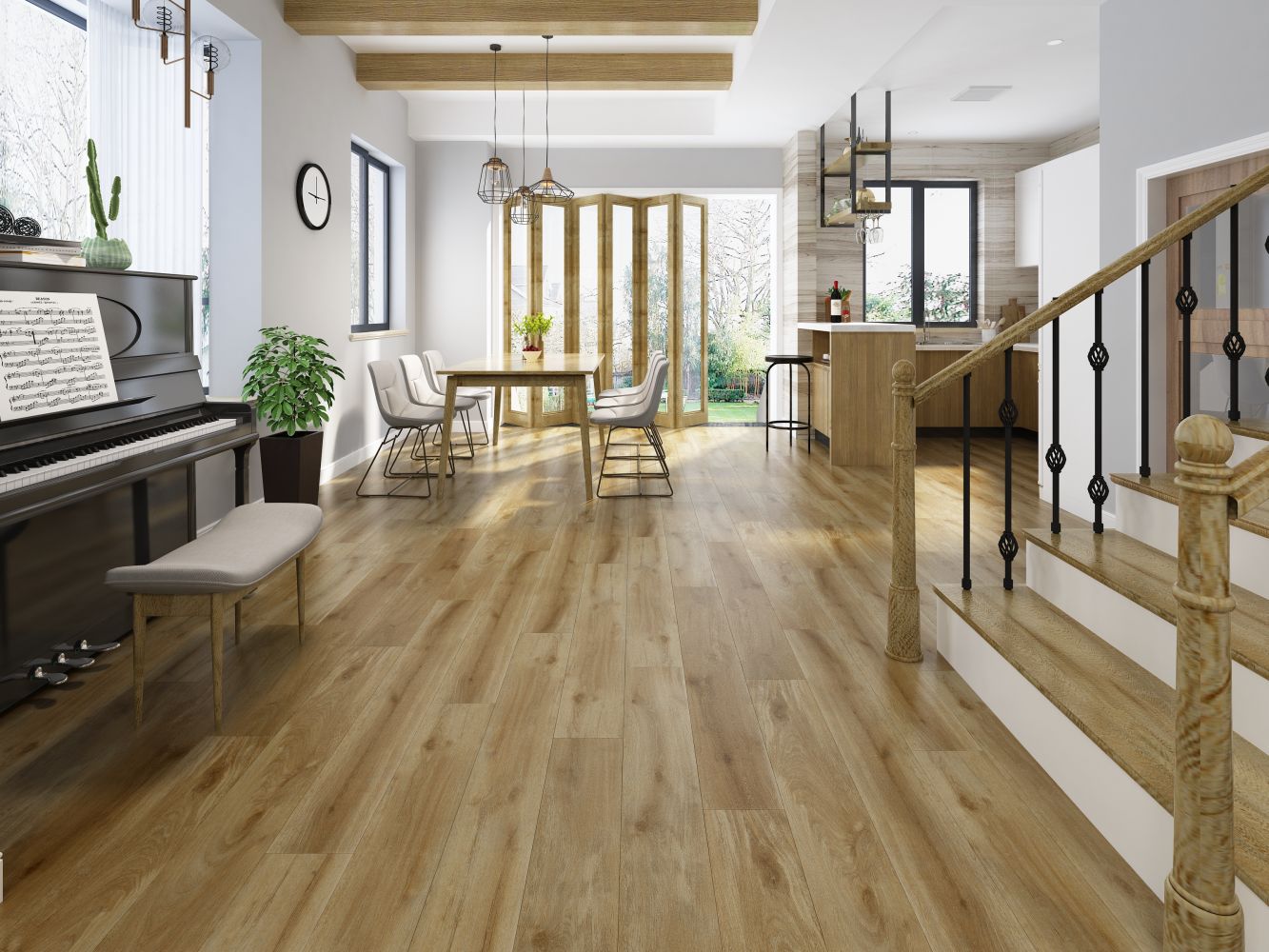
Moisture Resistance
Engineered hardwood is comparatively more moisture-resistant than solid hardwood but still vulnerable to damage in high-moisture environments.
Maintenance & Refinishing
Engineered hardwood, on the other hand, may need occasional refinishing to maintain its appearance.
Sound Insulation & Comfort Underfoot
Engineered hardwood typically provides better acoustic insulation compared to vinyl flooring. However, this can be mitigated by adding quality underlayment beneath a luxury vinyl plank floor.
Choosing the perfect flooring should center around your lifestyle, budget, and usage requirements.
📝 Factors to Consider Before Choosing
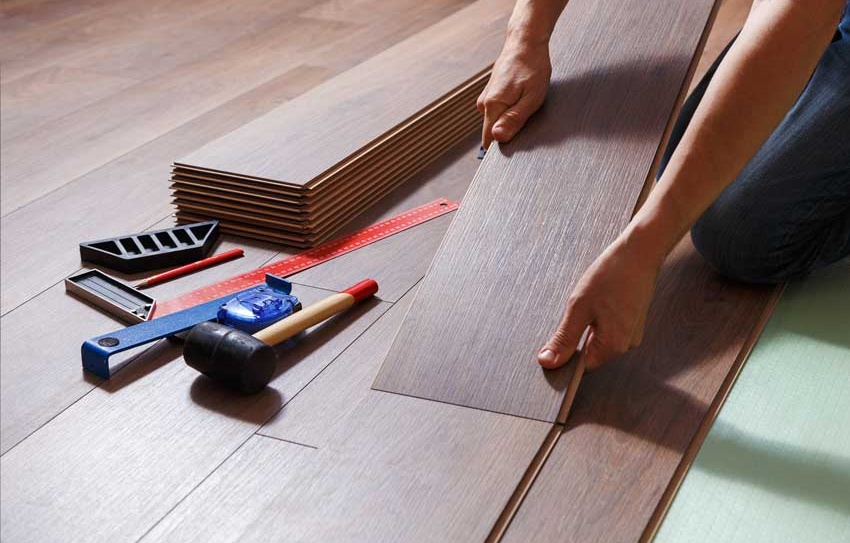
Lifestyle and Usage
Though engineered hardwood woos with its beauty and inviting warmth, it isn’t resistant to every scratch or dent, which may cause a stir in places drenched in activity or crawling with pets.
But let’s not forget about luxury vinyl flooring – a champion in resilience that laughs in the face of wear and tear. If your home is abuzz with energy and movement, it’s a contender that’s hard to beat.
Moisture Exposure
Engineered hardwood might have secured the upper hand over solid hardwood in terms of moisture resistance, but in the face of constant or high humidity, it may throw in the towel and let warping or distortion creep in.
Budget, ROI & Resale Value
Your wallet’s health is a pivotal factor in deciding the winner in the flooring race. Engineered hardwood might deliver a sucker punch with its heftier per-square-foot price tag and potential additional installation costs.
On the flip side, luxury vinyl plank plays the friendly neighborhood superhero, giving you the sweet blend of visual pleasure and functional strength at a price that doesn’t break the bank.
At Cabinets Core, though, we have budget-friendly options for both engineered hardwood and LVP/SPC, and you can choose what you love most at a great price!
Aesthetic Preference
In the case you lean more towards wallet-friendly options exhibiting a flair for design versatility, luxury vinyl plank flooring steps up to claim the crown.
Maintenance Expectations
In the case of vinyl floors, they might ring the bell for a replacement if they bear extensive marks of wear or damage.
Keep in mind the crème de la crème of flooring depends on what best enhances your living style, appeals to your aesthetic senses, and strikes a chord with your budget. Take the floorings for a test drive by sampling and inspecting them in the flesh before sealing the deal.
And hey, you can always call in the cavalry – reach out to a flooring wizard who can steer you toward the selection that hugs the corners of your home just right.
❓ FAQ: Engineered Hardwood vs Luxury Vinyl Plank
Here, we answer common questions and help clarify the distinctions between luxury vinyl and engineered hardwood flooring.
1. Which is better, vinyl or engineered hardwood?
But for many homeowners, engineered hardwood’s natural warmth and timeless beauty outweigh vinyl’s resilience. Engineered brings you real wood’s appeal at a fraction of the cost of solid hardwood. Just be ready for some maintenance down the road.
2. Should I choose engineered or luxury vinyl planks?
But you can’t go wrong with either. Pick EVP if you want a super stable and quiet floor with a wood-like feel. Opt for LVP if you simply want an affordable, indestructible surface that’s easy to install anywhere.
Your needs and style preferences will steer you right!
3. How do I know engineered hardwood from luxury vinyl?
Another telltale sign is refinishing – you can sand and refinish engineered wood, but vinyl cannot be refinished. And remember, only engineered has real natural wood on the surface. But today’s luxury vinyl sure does an excellent job of imitating it on a budget!
4. What's more durable, vinyl plank or engineered wood?
But engineered hardwood has its own strength – refinishing essentially renews the wood to look freshly installed again. So both maintain durability long-term through different means.
Ultimately, pick vinyl if you want to install it and forget it without constant upkeep. Choose engineered if you don’t mind refinishing every decade or so for like-new floors.
5. What is engineered hardwood flooring?
Engineered hardwood flooring is made of layers, which makes it stronger and less expensive than solid hardwood. It looks like real wood but is more durable and affordable.
6. hat is luxury vinyl plank (LVP) flooring?
Luxury vinyl plank flooring mimics the appearance of wood but is made of synthetic materials, making it more affordable and easier to take care of.
7. Which is cheaper, engineered hardwood, or luxury vinyl plank flooring?
Luxury vinyl plank flooring is usually more budget-friendly compared to engineered hardwood
8. Which flooring lasts longer, engineered hardwood, or luxury vinyl plank?
Luxury vinyl plank flooring is typically more resilient against scratches, dents, and water damage compared to engineered hardwood.
9. What do I need to consider when choosing between engineered hardwood and luxury vinyl plank flooring?
Factors to consider include lifestyle and usage, moisture exposure, budget, aesthetic preference, and maintenance requirements.
10. Can luxury vinyl plank flooring look like real wood?
Yes, luxury vinyl plank flooring can convincingly mimic the look of real wood through advanced printing and embossing techniques.
11. How can I tell the difference between engineered hardwood and luxury vinyl plank flooring?
Engineered hardwood typically has noticeable wood grains and a warmer, more textured feel underfoot compared to luxury vinyl plank flooring.
12. Which flooring option is easier to maintain, engineered hardwood, or luxury vinyl plank?
Luxury vinyl plank flooring tends to require less maintenance as it is resistant to stains, easy to clean, and does not require periodic refinishing like engineered hardwood might.
13. What are the advantages of Stone Plastic Composite (SPC) flooring?
SPC flooring is highly durable, moisture-resistant, provides an authentic hardwood feel underfoot, requires minimal maintenance, and offers superior sound insulation compared to standard luxury vinyl plank.
14. What are the benefits of luxury vinyl plank flooring over engineered hardwood?
Luxury vinyl plank flooring is more budget-friendly, easier to install, and more resilient against scratches, dents, and water damage compared to engineered hardwood.
Conclusion
Each flooring type—engineered hardwood and luxury vinyl plank—brings unique benefits. Engineered hardwood impresses with its natural elegance, warmth, and value-adding qualities. It’s a timeless option that can be refinished multiple times, proving its durability.
On the other hand, luxury vinyl plank stands out for its supreme durability, water resistance, and affordability. It’s a practical choice that doesn’t compromise on aesthetics, given its vast range of designs that convincingly mimic wood and other materials.
At Cabinets Core, we understand that selecting the right flooring is a crucial decision that impacts your home’s appeal and functionality. With our extensive experience and knowledge, we can guide you toward the best choice for your particular needs, taste, and budget.
Ready to take the next step?
Book your consultation and get a personalized quote for your flooring project! Our team of experts is ready to help transform your space.

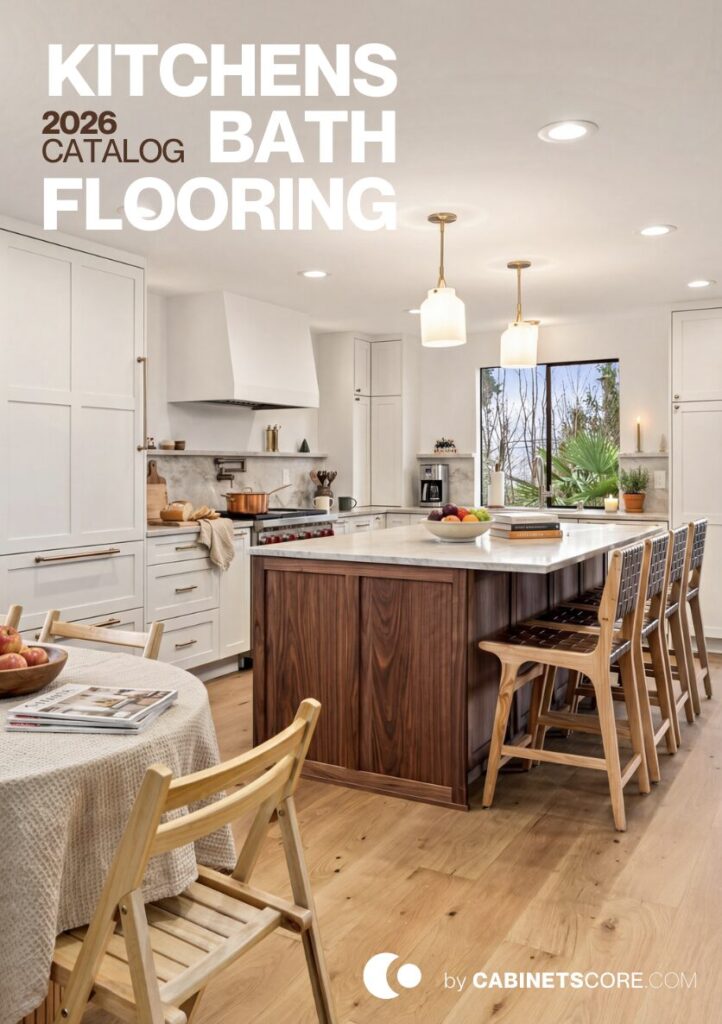

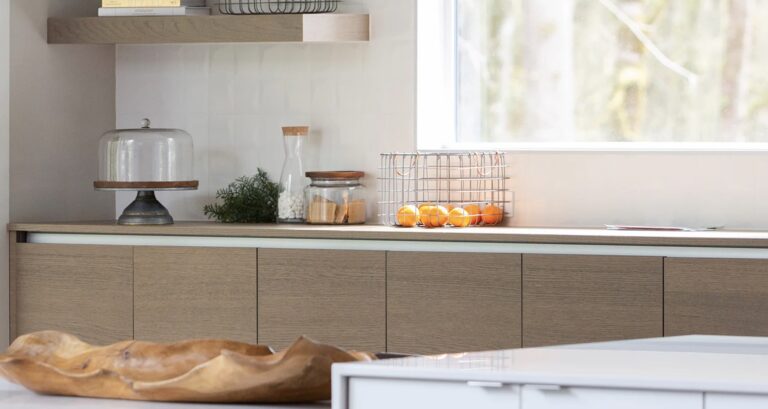
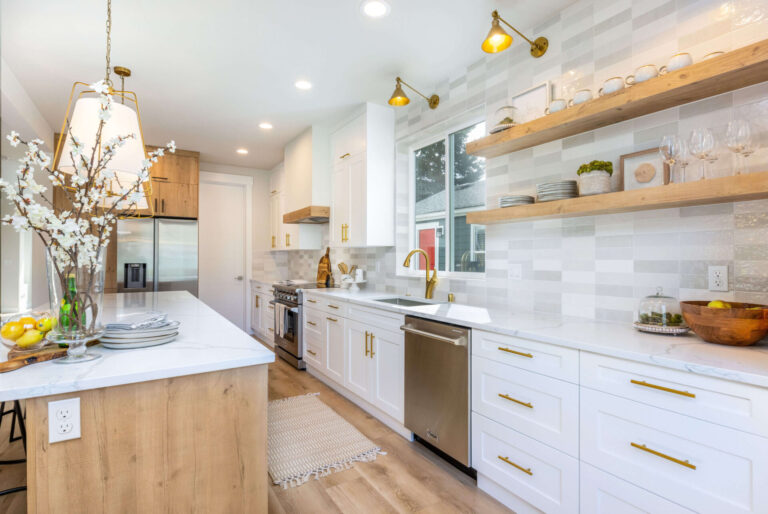
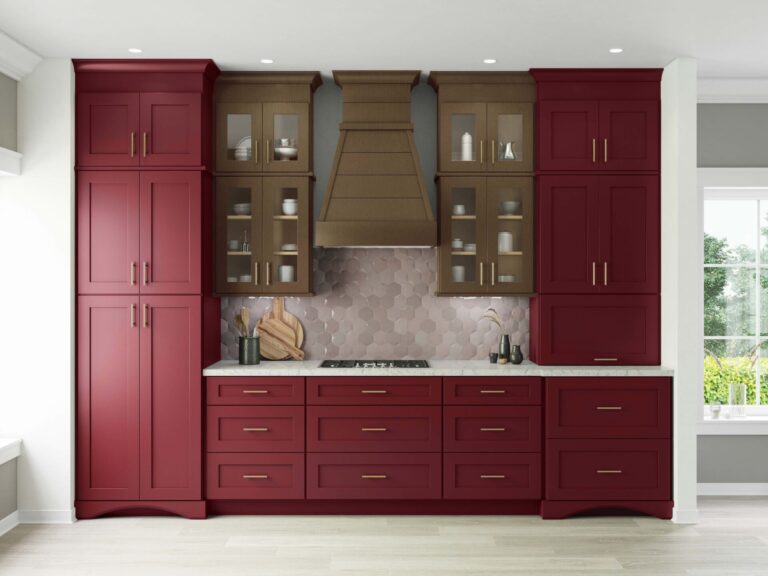
You must be logged in to post a comment.